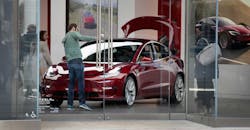Tesla Inc. has reached a preliminary agreement with the Shanghai government to build a factory that’ll rival production from its lone U.S. assembly plant, as Elon Musk takes his biggest step yet to expand overseas.
The electric-car maker’s planned capacity for the factory is 500,000 vehicles a year, the Shanghai government said in statement. Bloomberg reported earlier that Musk, Tesla’s chief executive officer, would be in the city for an event with the government on Tuesday. A Tesla representative in China didn’t immediately respond to a request for comment.
While Tesla has been working on setting up production in China for more than a year, President Donald Trump has been trying to bolster manufacturing in the U.S. Tesla follows Harley-Davidson Inc. in expanding outside the U.S., underscoring the urgency with which companies are moving to avoid damage from escalating trade disputes.
Tesla shares extended their advance before the start of regular trading to gain as much as 3.4%.
The youngest publicly held U.S. automaker is looking to expand its capacity and to more efficiently reach global markets. Tesla’s lone car-assembly plant is in Fremont, California, and it has a giant battery factory in neighboring Nevada. After moving ahead in China, the world’s largest market for electric vehicles, Tesla has said it will reveal plans toward the end of 2018 to build a plant in Europe.
While Musk, 47, said in May 2016 that he expected Tesla would produce 500,000 vehicles a year from Fremont by 2018, the company has repeatedly fallen short of his manufacturing goals with the Model 3 sedan. Tesla has built about 88,000 cars through the first half of this year.
Tesla said a year ago it was working with the Shanghai government to explore local manufacturing. Since then, production in China has become even more crucial: Last week, in response to tariffs imposed by the U.S., China increased the import duty on U.S.-made cars to 40%, prompting Tesla to raise prices. A plant in China also reduces shipping costs and potentially makes sourcing components more economical.
The company has boosted prices of Model S sedans and Model X crossovers in China by as much as $30,000 after Beijing imposed additional duties on American-built autos, putting its vehicles beyond the reach of more consumers in its No. 2 market globally.
In November, Musk said Tesla is about three years away from starting production in the world’s largest auto market. The plant will make a couple hundred thousand vehicles a year for buyers in China and potentially other parts of Asia, he said at the time. Tesla probably will make the smaller Model 3 sedan and upcoming Model Y crossover in China, he said then, rather than the pricier Model S sedan or Model X sport utility vehicles, which often sell for more than $100,000 in the U.S.
China presents a massive growth opportunity for Tesla and rivals such as BMW AG and Daimler AG, which are seeking to take advantage of a massive and fast-growing market for new-energy vehicles. That category, which includes battery-powered, plug-in hybrid and fuel-cell automobiles, reached 777,000 units last year and could surpass 1 million this year, according to estimates by the China Association of Automobile Manufacturers. The government’s target is 7 million vehicles a year by 2025.
Tesla sold 14,779 vehicles in China last year, according to data from LMC Automotive. That gave it about 3% of the nation’s battery-powered electric-vehicle market, placing it as the No. 10 brand in that segment. China accounted for 17% of Tesla’s revenue for 2017, according a filing with U.S. regulators.
Ramping up manufacturing is critical to the carmaker being able to sustain itself financially while pursuing Musk’s mission to transition the world to battery-powered transportation. Tesla produced 5,031 Model 3s in the last week of the second quarter in its Fremont plant, meeting a target that Musk had said was crucial to generating cash and earning profit.
By Bloomberg News
About the Author
Bloomberg
Licensed content from Bloomberg, copyright 2016.
